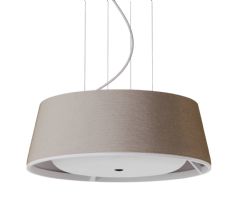~1.jpeg&newwidth=80) Written by Kelsey Lauer, BA, BSN, RN
Written by Kelsey Lauer, BA, BSN, RN
Whether it’s the morning greetings from a household pet, the companionship of well-known neighbors, the gentle pattering of rain on the roof, or the ability to stroll through a home that’s alive with cherished memories, aging in place provides seniors with experiences that carry meaning and depth. This daily sense of familiarity and routine contributes to an older adult’s sense of identity, self-esteem, and independence as well. With three out of four people aged 50 and over wanting to remain in their homes for the long term, the movement to support aging in place is gaining traction as more people recognize its many benefits. We invite you to read on to learn more about the multiple ways aging in place can improve mental health for aging seniors.
 | Nobi Smart Lamp System for Aging in Place View Product |
Home is where the heart is—helping to maintain a familiar and comfortable living space, aging in place can help older adults eliminate the multiple stressors often inherent with new surroundings and unfamiliar people. Older people tend to value the predictability and continuity that aging in place in their own homes provide, along with the sense of autonomy, independence, and control they have in their own lives. Although nursing homes offer a more comprehensive form of care with 24/7 medical support and supervision, a four-year study concluded that people aging in place who also received long-term care in their homes had improved mental and physical health compared with those who were in nursing homes. The ability to maintain community continuity, social networks, and family ties also helps older adults to optimize their mental health.
Recommended: Nobi Smart Lamp System for Aging in Place
Proven to promote a positive quality of life along with optimizing life satisfaction and self-esteem, aging in place is one of the best ways to retain happiness and health well into old age. Familiar routines and surroundings enhance life satisfaction, allowing seniors to feel more content and secure. In addition, the ability to function independently results in a sense of accomplishment, enhancing self-esteem and overall happiness with life. Thanks to a sense of identity developed through through independence, autonomy, and social connections to the community, aging in place often helps older adults to feel happier and more fulfilled than their peers who live in nursing homes. While our home is perceived as a place to live, a nursing home can sometimes be viewed as just a place to be forgotten.
Addressing the needs of the mind is just as important as the needs of the body, especially for older adults. Most of us are more fearful about the potential loss of our mental capability than a decline in our physical ability. Studies continue to demonstrate that cognitive decline and the risk of dementia can be reduced by encouraging some healthier habits like physical activity, good social connections, participation in stimulating activities, and engagement in intellectual endeavors. Surrounded by memories, seniors who age in place are typically more stimulated by their home environment and familiar community than those who live in nursing homes. Volunteering, working on a hobby, spending time with family and friends, and learning new skills are all meaningful activities that help to create a sense of purpose and keep older minds sharp, interested, and functional.
When older people are removed from their homes, communities, and social networks to live in a nursing home or assisted living, they may suffer from the loss of connection. A growing body of research indicates that seniors aging in place who remain active and involved with their community reap a number of physical and mental health benefits. Volunteering and civic engagement have been shown to reduce mortality, depression, hopelessness, and loneliness while improving a sense of purpose, optimism, and physical activity. Visiting with family and friends, joining in-person or online groups with mutual interests, and participating with a local senior center can all help with boosting mental health— which also leads to a healthier and happier lifestyle overall.
Like people of all ages, older adults tend to feel calmer and less anxious when their living situation is stable, safe, and comfortable. Offering a sense of comfort, familiarity, and security, the emotional value of a home is much more important to many seniors than its monetary value. Living in a space that is truly theirs, where they can make their own choices and still access supportive care when it’s needed can empower older folks, positively influencing mood and mental health. The many benefits of aging in place we’ve discussed thus far all help to lower the risk of anxiety and depression - autonomy, social connections, community involvement, intellectual endeavors, and mental/emotional stimulation.
Cooking and food are both powerful tools that bring engagement, sensation, and overall purpose for older adults aging in place at home. Eliciting strong memories, the sensory tastes and cooking smells often provide a sense of warmth and comfort, helping to enhance overall well-being. Frequently referred to as the main hub of the entire household, the kitchen is one of the most vital rooms in the home. Therefore, it’s crucial to ensure this space is safe, secure, and senior-friendly. Providing safe access and assistive technology to adapt the kitchen to meet the senior’s unique requirements can help them to feel more empowered, improve their cognitive function, and reduce the risk of depression, falls, and other common kitchen-related injuries.
Recommended: FireAvert Automatic Shut-Off Device for Stoves and Microwaves
 | Geemarc AmpliPower 60 Telephone for the Hearing Impaired View Product |
Ensuring seniors who are aging in place have access to various lines of communication will help to optimize their safety and provide peace-of-mind support. Assistive technology communication devices help older adults to see, hear, and speak. Talking/voice-command devices, amplified phones, video intercoms, door alarms, and personal/medical alert systems that provide two-way communication are a few of the more popular methods seniors aging in place utilize to access and improve communication. Accessible and easy-to-use mobile phones can also help older folks to stay connected to friends and family.
Recommended: Geemarc AmpliPower 60 Telephone for the Hearing Impaired
Constantly changing throughout our lifespan, the brain continues to grow new neurons and neural connections. Seniors aging in place can positively impact their brain function by engaging in cognitively-stimulating activities that are fun, but also challenging. Helping to give the brain a workout, playing brain games can help to slow the degenerative loss that can accompany aging, along with improving mental health. Computer games, puzzles, board games, and anything that helps you learn something new stimulate the brain, boosting memory, attention, reasoning, speed, and concentration skills.
Depending on the mobility and physical ability of the senior aging in place, some home modifications may be necessary in order to provide a safe and accessible environment. Like the kitchen, the bathroom is another heavily used space that’s also potentially full of dangers, especially slips and falls. Installing grab bars, slip-resistant mats, and shower chairs can help to optimize safety for older adults aging in place, along with raised toilet seats, toilet safety frames, and other adaptive bathroom safety products. The ability to use the bathroom independently and perform daily hygiene tasks without assistance can go a long way toward improving the mood, dignity, and quality of life of an older adult aging in place at home.
Recommended: Firm Cardinal Health Support Grab Bar
It comes as no surprise that the majority of the elderly population want to age in place in their own home - a place they associate with holiday traditions, gatherings, and fond memories. Aging in place makes it easier for family and friends to visit any time they want, while alsohelping seniors to maintain the social networks and community connections to which they are accustomed. Research shows that older adults who age in place while receiving appropriate care have improved mental and physical health compared to those in nursing homes. Familiarity and comfort increase feelings of well-being and happiness, helping to enhance quality of life, and maximizing independence and life fulfillment.
Thanks for taking the time to learn more about how aging in place can improve mental health, and we encourage you to read more helpful, evidence-based, and educational articles at our free Caregiver University resource.
.jpeg&newwidth=250)
Kelsey Lauer, a dedicated registered nurse, brings a wealth of knowledge and expertise in supporting seniors to age gracefully in the comfort of their own homes. With years of experience in perianesthesia, stepdown ICU, and surgical telemetry, Kelsey understands the unique challenges and needs that arise as individuals age.
Kelsey's academic accomplishments include holding bachelor's degrees in both English and nursing. This unique combination of disciplines reflects her passion for effective communication and her desire to provide exceptional care to those in need. With a passion for exploring diverse medical subjects and “translating” them for the benefit of patients and their families, Kelsey Lauer finds great joy in writing. Her expertise in this realm has led to the publication of her works in multiple esteemed platforms. Kelsey's journey reflects a remarkable blend of creativity, compassion, and a genuine desire to make a positive difference. With her engaging writing style and dedication to healthcare, she continues to inspire and empower others through her words and actions.